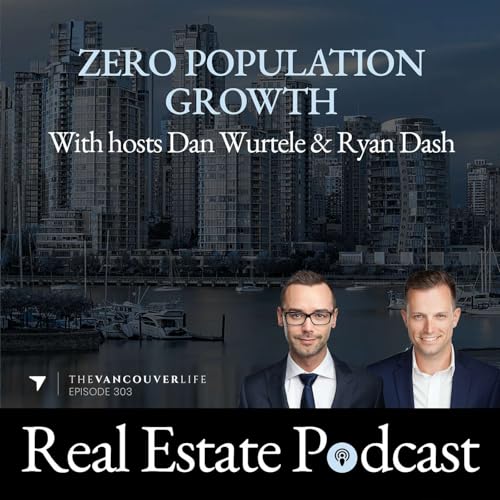
ZERO Growth: How Canada’s New Population Targets Will Reshape the Housing Market
No se pudo agregar al carrito
Add to Cart failed.
Error al Agregar a Lista de Deseos.
Error al eliminar de la lista de deseos.
Error al añadir a tu biblioteca
Error al seguir el podcast
Error al dejar de seguir el podcast
-
Narrado por:
-
De:
For years, one of the driving narratives in Canadian real estate was deceptively simple: population growth equals home-price growth. Between 2021-2023, that tailwind was unmistakable — massive immigration, booming temporary residents, and a swelling demand for housing fueled price rises across the country. But that story is now changing. The latest federal budget from Ottawa projects zero population growth for the first time in modern history — a signal that the era of “Demographic Alpha” may be over.
In British Columbia, the October numbers underscore the shifting landscape. Home sales across the province dropped by 10% year-over-year, with only 6,370 units sold, yet the average price ticked up to $987,600 (a modest 0.8 % increase). At first glance, that may seem counter-intuitive—especially given the drop in the Greater Vancouver region, where prices actually fell 3.4%. What it reveals is a province where local dynamics are diverging: outside the Lower Mainland some markets are still inching up.
Nationally, every province except Ontario is showing year-over-year price increases. Ontario is down about 2.9%, even though pockets within have seen drops of 30 % or more. Two regions — Newfoundland and the Northwest Territories — are up more than 10%. So while the broader narrative remains “prices rising,” it’s the hyper-local story that matters.
Let’s go back to population. For decades, Canadian real estate bulls pointed to one immutable fact: we kept growing. New people meant new renters, new buyers, new demand — the structural scarcity argument. But Ottawa’s policy shift is turning the page. Between 2020 and 2024, population growth was arguably the strongest single driver of housing returns: it boosted rentals, shortened vacancy, supported pre-construction profits. Now the federal government’s reduced intake of permanent and temporary residents is removing that force. Growth dropping from 3% to near zero rewrites the math of valuations.
The consequences are broader than real estate: GDP growth in recent years has largely been powered by population expansion. With shrinking labour-force growth and rising youth and newcomer unemployment already flagged by the Bank of Canada, housing demand will be impacted. In effect, immigration policy is now acting as a rate hike — cooling demand without touching interest rates. For investors and developers, the easy “demographic premium” is gone.
Condo starts continue to collapse. New sales of condo units have tanked, and about 18 months later condo starts follow that trajectory. We’re seeing new-home construction at 15-year lows, fewer jobs in building trades, fewer units coming to market. And then there’s the demographic domino effect.
So what does this all mean for you—or for anyone who’s betting on real estate? The thesis of perpetual population-driven housing demand is under threat. Scarcity is no longer guaranteed. The fundamentals are shifting: slower growth means slower demand, longer lease-ups, muted appreciation. For developers, investors and agents alike: adaptation is key. The era of demographic tailwinds is fading. The question now is: who will stay ahead in the new chapter?
_________________________________
Contact Us To Book Your Private Consultation:
📆 https://calendly.com/thevancouverlife
Dan Wurtele, PREC, REIA
604.809.0834
dan@thevancouverlife.com
Ryan Dash PREC
778.898.0089
ryan@thevancouverlife.com
www.thevancouverlife.com


